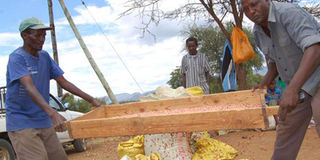Don’t earn peanuts, grow these groundnut varieties

Farmer Daniel Kiptoo cleans shelled groundnuts at Kapkayo market in Elgeyo Marakwet County. A Nairobi-based processor, Greenforest Company is currently buying the unshelled nuts at between Sh70 and Sh100 per kilo from the region. PHOTO | FRANCIS MUREITHI | NATION MEDIA GROUP
What you need to know:
- One should plant 30kg of groundnuts per acre instead of 25kg for better yields.
- Besides Valencia, other varieties the farmers are growing are CG7 and ICGV12991 (Spanish types), all which were developed by the International Crops Research Institute for the Semi-Arid Tropics (ICRISAT).
- However, one of the challenges the farmers are facing is lack of shelling machine as threshing is done manually.
Evaline Cheruiyot looks at her groundnut harvest in Chepsirei sub-location in Elgeyo Marakwet County with satisfaction.
She is happy that her yield has more than doubled ever since she adopted a big-seeded drought-tolerant variety known as ICGV90708 (Valencia type), which has seen her harvest 15 90kg bags from her acre.
“Initially, I would struggle to get five bags from my farm because I was recycling the local variety known as Cheplambus, which matures in six months. The new variety is good because it matures in two to three months,” says Evaline.
Besides Valencia, other varieties the farmers are growing are CG7 and ICGV12991 (Spanish types), all which were developed by the International Crops Research Institute for the Semi-Arid Tropics (ICRISAT) and introduced through collaborative efforts of Egerton University and USAID-Kenya, under Feed the Future Programme.
“The variety is offering farmers up to 20-25 bags per acre of unshelled nuts if good husbandry is done. It does well in hot, dry areas like Kerio Valley, where farmers normally don’t harvest much,” says Prof Paul Kimurto of Egerton University, adding the seeds can also be grown in dry parts of Nyanza (south), western and eastern.
Besides providing the seeds, Kimurto says farmers were trained last year on crop husbandry that included planting 30kg of groundnuts per acre instead of 25kg.
Evaline notes that early land preparation and planting at the onset of rains is crucial as they help in curbing the spread of pests such as termites, which damage roots, stems and pods.
And before she tills the land, she conducts a soil test to help her know nutrients her crop needs and if the soil is infected.
CROP'S CULTIVATION CHALLENGES
“I plough the land using a tractor at least twice before planting to make sure the soil has a fine tilth. Afterwards I dig 5-10cm deep trenches that are 30-40cm apart and add goat or sheep manure before planting the seeds and covering with soil.”
Decomposed manure, according to Kimurto, makes the pods bigger and protects the roots from being attacked by pests such as borers, cutworms and aphids, besides acting as a control measure for diseases such as early blight, cerspora leaf spots and groundnut rosette virus.
Once the crop attains three leaves or after 45 days, she starts weeding. She sprays the crop with pesticides at least twice to keep pests at bay and uproots diseased crops.
“When the leaves turn yellow, it means the crop has been attacked by a virus in the soil. I normally spray the crops and uproot the affected ones,” says Evaline, highlighting the lessons she gathered.
She uses a fork jembe to harvest, which is recommended as one is not likely to break the pods.
“Single fork hoe harvests many pods without damaging them unlike when I use a four forked hoe.” A bag of shelled nuts goes for between Sh10,000 and Sh12,000.
However, one of the challenges the farmers are facing is lack of shelling machine as threshing is done manually.
Another bottleneck facing the farmers is lack of market which has seen middlemen invade the area and exploit them.
The farmers, however, have formed Soy South–Kapkayo Farmers’ Cooperative Society as they seek to have a greater bargaining power.
Nairobi-based processor Greenforest Company is currently buying the unshelled nuts at between Sh70 and Sh100 per kilo from the society.




